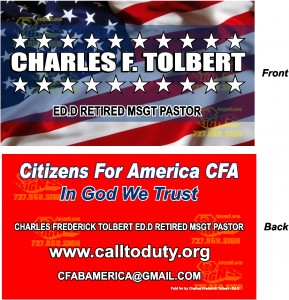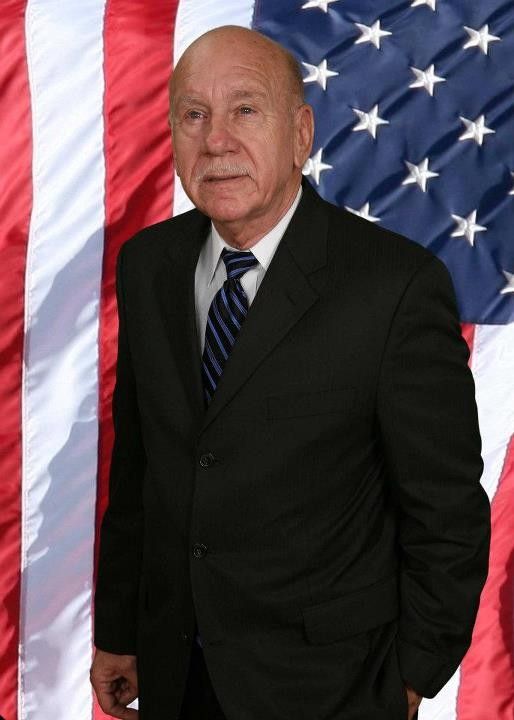Dear Mr. Tolbert,
The hearing before the Commission on February 18, 2016 was a probable cause determination hearing. The Commission found probable cause thus an Order of Probable Cause was issued and mailed to you on March 3, 2016. Your email comments will be included in the case materials provided to the Commission when hearing your case. Again, a notice of hearing will be mailed to you approximately 14 days prior to the hearing date.
Sincerely,
Donna Ann Malphurs
Agency Clerk
Ms. Malphurs
Please confirm whether the informal hearing with FEC on February 18, 2016, which Mr. Williams was present, was not in fact my informal hearing.
And why is the FEC continually pursuing action when no donations where taken according to:
Section 106.07 (809b) fines cannot exceed 25% of total receipts or expenditures, which ever are greater.
Since the DOE reports show I did not receive any donation there can be no fines.
In addition I provided extenuating circumstances to the FEC.
Furthermore why has
Option one-Consent order not been presented which the FEC should waiver all fines which is available should I agree.
Charles Frederick Tolbert EdD
March 11, 2016
Mr. Tolbert,
We are in receipt of your email requesting to be heard. You will be afforded an opportunity to speak at the informal hearing. I anticipate your case will be presented to the Commission at its May 18-19, 2016 meeting. A notice of hearing stating the date, time, and location of the meeting will be mailed approximately 14 days prior to the hearing date.
Sincerely,
Donna Ann Malphurs
Agency Clerk
fec@myfloridalegal.com
Florida Election Commission (FEC)
107 W. Gaines Str, Ste 224
Collins Blg
Tallahassee, Fl. 32399
Citizens For A Better America INC. Party of Florida
address change
From
Cfaba Inc
Charles Frederick Tolbert EdD
PO Box 23935
Ft Lauderdale Fl 33307
To
Cfaba Inc
Charles Frederick Tolbert EdD
PO box 740025
Orange City Florida 32774
Charles Frederick Tolbert EdD NPA
March 08, 2016
561-398-9025
Cfabamerica@gmail.com
I received a notice of “Probable Cause” on March 05, 2016, and I request I be allowed to present my side.
CFABA
Charles Frederick Tolbert EdD
Retired MSGT/Pastor
Ref: case no.: FEC 14-494; Respondent: Charles Frederick Tolbert
P O Box 740025
Orange City Fl. 32774
561-398-9025
cfabamerica@gmail.com
Florida Election Commission (FEC)
107 W. Gaines Str, Ste 224
Collins Blg
Tallahassee, Fl. 32399
CFABA
Charles Frederick Tolbert EdD
Retired MSGT/Pastor
Ref: case no.: FEC 14-484; Respondent: Charles Frederick Tolbert
P O Box 740025
Orange City Fl. 32774
561-398-9025
cfabamerica@gmail.com
To whom it may concern:
In reference to letters dated March 03, 2016 from FEC.
On March 8, 2016 I Charles Frederick Tolbert spoke with Jaakan A. Williams concerning reference letter and asked if there were other options as presented in cover letter dated March 8, 2016 paragraph two.
I was informed that I was required to fill out Affidavit of financial support (see attachment 1).
I also informed him that I had sent both by email and priority mail of extenuating circumstances and that in addition my mother was ill in 2014 and passed October 14, 2015. (Attachment 2)
Furthermore I mention that DOE has failed to respond to why in 2014 there was an increase of late filings.
In the notice of rights there are three options:
Option one-Consent order which the DEC should waiver all fines which is available should I agree.
I again presented
Section 106.07 (809b) fines cannot exceed 25% of total receipts or expenditures, which ever are greater.
Since the DOE reports show I did not receive any donation there can be no fines.
Option two-Whereas I agree that an informal hearing which was done on February 18, 2016
Option three-Formal hearing whereas I dispute all current findings by FEC. DOE has violated my constitutional rights under Statutes and other regulations (Section 106.07(7)) which hinder the voting rights of the American people are unconstitutional and the requirements for a candidate to report non income, non-acceptance of donations are a violation of my equal rights under amendment 14.
A state, or other federal government Agency, can only pass laws and statutes or set guidelines. If a candidates intent is correctly outlined and Tallahassee receives documentations to the fact that the candidate did not receive donations that said candidate has not violated any statues or constitutional requirement departments that were appointed by the governor cannot oversee, correct or take actions accordingly.
A government is the system by which a state or community is governed.[1] In the Commonwealth of Nations, the word government is also used more narrowly to refer to the collective group of people that exercises executive authority in a state.[2][3][4] This usage is analogous to what is called an “administration” in American English. Furthermore, government is occasionally used in English as a synonym for governance.
AMENDMENT XXIV
Passed by Congress August 27, 1962. Ratified January 23, 1964.
Section 1.
The right of citizens of the United States to vote in any primary or other election for President or Vice President, for electors for President or Vice President, or for Senator or Representative in Congress, shall not be denied or abridged by the United States or any State by reason of failure to pay any poll tax or other tax.
Section 2.
The Congress shall have power to enforce this article by appropriate legislation.
http://www.archives.gov/exhibits/charters/constitution_amendments_11-27.html
“Where rights secured by the Constitution are involved, there can be no rule making or legislation which would abrogate them.” Miranda vs. Arizona, 384 U.S. 436, 491.
“An unconstitutional act is not law; it confers no rights; it imposes no duties; it affords no protection; it creates no office; it is in legal contemplation, as inoperative as though it had never been passed.”
Norton vs. Shelby County, 118 US 425, 442.
The States can only oversee time, places, and manner Article 1 section 4.
The DOE and the FEC are in violations of Amendment to the United States Constitution.
These are the constitutional violations committed by the division of elections and the Florida Election Commission against Charles Frederick Tolbert for candidate running for office in Florida.
The Fifth Amendment (Amendment V) to the United States Constitution is part of the Bill of Rights and protects a person against being compelled to be a witness against himself or herself in a criminal case. “Pleading the Fifth” is a colloquial term for invoking the privilege that allows a witness to decline to answer questions where the answers might incriminate him or her, and generally without having to suffer a penalty for asserting the privilege. A defendant cannot be compelled to become a witness at his or her own trial. If, however, he or she should choose to testify, he or she is not entitled to the privilege, and inferences can be drawn from a refusal to answer a question during cross-examination. The Amendment requires that felonies be tried only upon indictment by a grand jury. Federal grand juries can force people to take the witness stand, but defendants in those proceedings have Fifth Amendment privilege until they choose to answer any question. To claim the privilege for failure to answer when being interviewed by police, the interviewee must have explicitly invoked their constitutional right when declining to answer questions.
The Amendment’s Double Jeopardy Clause provides the right to be tried only once in federal court for the same offense. The Amendment also has a Due Process Clause(similar to the one in the 14th Amendment) as well as an implied equal protection requirement (Bolling v. Sharpe). Finally, the Amendment requires that the power of eminent domain be coupled with “just compensation” for those whose property is taken.
Sixth Amendment to the United States Constitution
Changes must be reviewed before being displayed on this page.
The Sixth Amendment (Amendment VI) to the United States Constitution is the part of the United States Bill of Rights that sets forth rights related to criminal prosecutions. The Supreme Court has applied the protections of this amendment to the states through the Due Process Clause of the Fourteenth Amendment.
Seventh Amendment to the United States Constitution
The Seventh Amendment (Amendment VII) to the United States Constitution is part of the Bill of Rights. This amendment codifies the right to a jury trial in certain civil cases, and inhibits courts from overturning a jury’s findings of fact.
An early version of the Seventh Amendment was introduced in Congress in 1789 by James Madison, along with the other amendments, in response to Anti-Federalist objections to the new Constitution. Congress proposed a revised version of the Seventh Amendment to the states on September 28, 1789, and by December 15, 1791, the necessary three-quarters of the states had ratified it. Secretary of State Thomas Jefferson announced the adoption of the amendment on March 1, 1792.
The Seventh Amendment is generally considered one of the more straightforward amendments of the Bill of Rights. While the Seventh Amendment’s provision for jury trials in civil cases has never been incorporated (i.e., applied to the states) almost every state voluntarily complies with this requirement. The prohibition of overturning a jury’s findings of fact applies to federal cases, state cases involving federal law, and to review of state cases by federal courts.[1] United States v. Wonson (1812) established the “historical test”, which interpreted the amendment as relying on English common law to determine whether a jury trial was necessary in a civil suit. The amendment thus does not guarantee trial by jury in cases under maritime law, in lawsuits against the government itself, and for many parts of patent claims. In all other cases, the jury can be waived by consent of the parties.
The amendment additionally guarantees a minimum of six members for a jury in a civil trial. The amendment’s twenty dollar threshold has not been the subject of much scholarly or judicial writing; that threshold remains applicable despite the inflation that has occurred since the 18th century.
The Eighth Amendment (Amendment VIII) to the United States Constitution is the part of the United States Bill of Rights (ratified December 15, 1791[1]) prohibiting the federal government from imposing excessive bail, excessive fines, or cruel and unusual punishment. The U.S. Supreme Court has ruled that this amendment’s Cruel and Unusual Punishment Clause also applies to the states. The phrases in this amendment originated in the English Bill of Rights of 1689.
The Ninth Amendment (Amendment IX) to the United States Constitution addresses rights, retained by the people, that are not specifically enumerated in the Constitution. It is part of the Bill of Rights.
The Tenth Amendment (Amendment X) to the United States Constitution, which is part of the Bill of Rights, was ratified on December 15, 1791.[1] It expresses the principle of federalism, which strictly supports the entire plan of the original Constitution for the United States of America, by stating that the federal government possesses only those powers delegated to it by the United States Constitution. All remaining powers are reserved for the states or the people.
The Fourteenth Amendment (Amendment XIV) to the United States Constitution was adopted on July 9, 1868, as one of the Reconstruction Amendments. The amendment addresses citizenship rights and equal protection of the laws, and was proposed in response to issues related to former slaves following the American Civil War. The amendment was bitterly contested, particularly by Southern states, which were forced to ratify it in order for them to regain representation in Congress. The Fourteenth Amendment, particularly its first section, is one of the most litigated parts of the Constitution, forming the basis for landmark decisions such as Roe v. Wade (1973) regarding abortion, Bush v. Gore(2000) regarding the 2000 presidential election, and Obergefell v. Hodges (2015) regarding same-sex marriage. The amendment limits the actions of all state and local officials, including those acting on behalf of such an official.
The amendment’s first section includes several clauses: the Citizenship Clause, Privileges or Immunities Clause, Due Process Clause, and Equal Protection Clause. The Citizenship Clause provides a broad definition of citizenship, overruling the Supreme Court’sdecision in Dred Scott v. Sandford (1857), which had held that Americans descended from African slaves could not be citizens of the United States. The Privileges or Immunities Clause has been interpreted in such a way that it does very little.
The Due Process Clause prohibits state and local government officials from depriving persons of life, liberty, or property without legislative authorization. This clause has also been used by the federal judiciary to make most of the Bill of Rights applicable to the states, as well as to recognize substantive and procedural requirements that state laws must satisfy.
The Equal Protection Clause requires each state to provide equal protection under the law to all people within its jurisdiction. This clause was the basis for Brown v. Board of Education(1954), the Supreme Court decision that precipitated the dismantling of racial segregation, and for many other decisions rejecting irrational or unnecessary discrimination against people belonging to various groups.
The second, third, and fourth sections of the amendment are seldom litigated. However, the second section’s reference to “rebellion and other crime” has been invoked as a constitutional ground for felony disenfranchisement. The fifth section gives Congress the power to enforce the amendment’s provisions by “appropriate legislation”. However, under City of Boerne v. Flores (1997), Congress’s enforcement power may not be used to contradict a Supreme Court interpretation of the amendment:
In addition:
UNITED STATES CODE
TITLE 18 – CRIMES AND CRIMINAL PROCEDURE
PART I – CRIMES
CHAPTER 13 – CIVIL RIGHTS
§ 241. Conspiracy against rights
If two or more persons conspire to injure, oppress, threaten, or intimidate any inhabitant of any State, Territory, or District in the free exercise or enjoyment of any right or privilege secured to him by the Constitution or laws of the United States, or because of his having so exercised the same; or
If two or more persons go in disguise on the highway, or on the premises of another, with intent to prevent or hinder his free exercise or enjoyment of any right or privilege so secured –
They shall be fined not more than $10,000 or imprisoned not more than ten years, or both; and if death results, they shall be subject to imprisonment for any term of years or for life.
§ 242. Deprivation of rights under color of law
Whoever, under color of any law, statute, ordinance, regulation, or custom, willfully subjects any inhabitant of any State, Territory, or District to the deprivation of any rights, privileges, or immunities secured or protected by the Constitution or laws of the United States, or to different punishments, pains, or penalties, on account of such inhabitant being an alien, or by reason of his color, or race, than are prescribed for the punishment of citizens, shall be fined not more than $1,000 or imprisoned not more than one year, or both; and if bodily injury results shall be fined under this title or imprisoned not more than ten years, or both; and if death results shall be subject to imprisonment for any term of years or for life.
Summary:
I have requested the total number of individuals from all political parties and non-party affiliation that missed filing deadline this information was not provided to me it is my contention that the computers failed to register the proper data.
I have requested a recount of the election votes for 2014 governor raced based on FOX News had me at 14% that we received 80 to vote. In addition I was not allowed to debate Scott or Criss because I was a NPA per Leadership Florida.
I request that I confront my accuser as per the US Constitution, as such the computer is not able to present itself to the court that all information received there-of is invalid as is, and has been documented by the red light camera system.
If the state presents their information through a lawyer I request that the state also provides a lawyer on my behalf and should there be any penalties or fines that this Be tried in a court of my peers as per the United States Constitution.
In addition the division of elections and the Florida election commission falls under the executive branch therefore they have no authority to create laws or establish fines.
I request a complete review of the candidate handbook and that the state Congress gets involved and assigns a court to oversee the election procedures in the state of Florida as per the Florida Constitution and its requirements to follow the US Constitution.
In closing, and in addition, I have provided documents and an affidavit from the treasure Ms. Hagandorf who states she did file all reports in a timely manner. DOE found an error on one filing report for myself and I know that I absolutely did file the report on time.
Cfaba Inc
Charles Frederick Tolbert EdD
PO box 740025
Orange City Florida 32774
Www.cfabamerica.com
Please respond within 14 days of receipt of this message.
Citizens for a better America
Enclosure and notarized affidavit to be sent by certified mail on March 10, 2016









